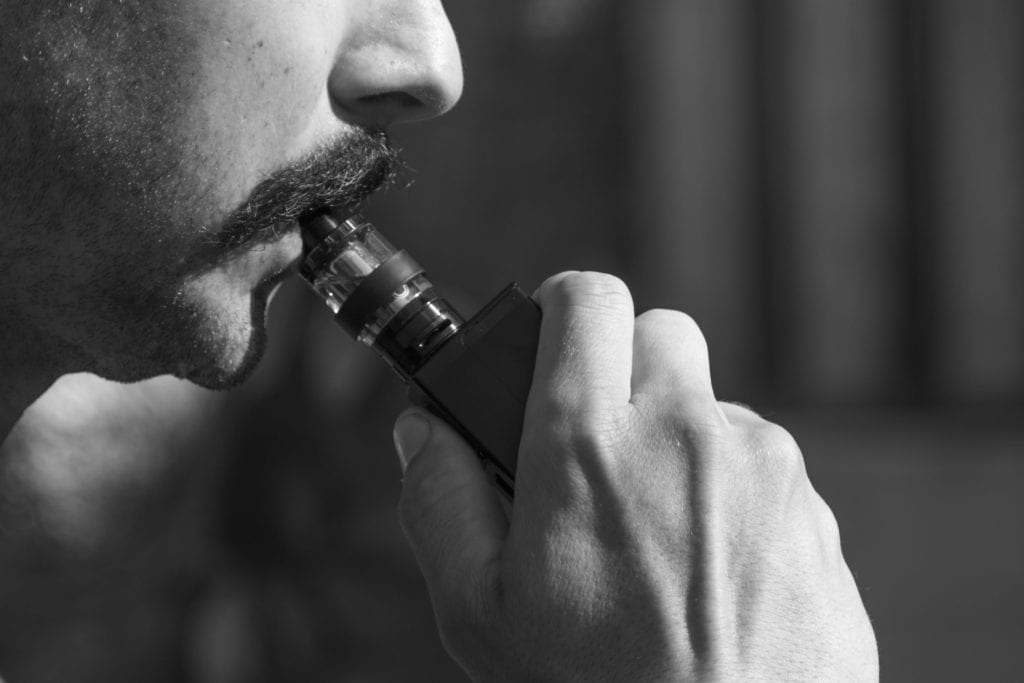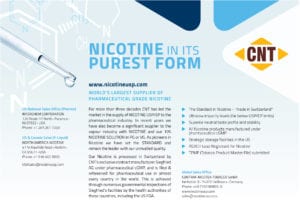
The UKVIA does a commendable job of promoting sensible vapor regulations. Will health authorities listen?
By George Gay
In March, I received a press note entitled, “The U.K. Vaping Industry Association [UKVIA] blasts World Health Organization [WHO] and says it risks becoming an ‘enemy of harm reduction.’”
The UKVIA cannot be described as a militant organization. It has firm ideas, but it prefers to work quietly and closely with the U.K. government, health authorities and anybody else willing to listen to its tale of running businesses that promote tobacco harm reduction while trying to turn a profit. So, the tone of the heading made me sit up.
What the UKVIA objected to in the first instance was what it described as “[r]ecent recommendations made by the WHO study group on Tobacco Product Regulations that would prohibit electronic nicotine[-delivery] and nonnicotine-delivery systems where the user can control device features and liquid ingredients.”
On the face of it, I can certainly understand the UKVIA’s concern. Banning such products would be like banning automobiles with accelerator pedals because they could be used to make a vehicle travel at beyond the speed limit or banning glasses because they could be used to mix mind-altering drugs with lemonade.
It has been said—rightly in my view—that newspapers are organizations that cannot tell the difference between a bicycle accident and a world war. By the same token, it would seem the WHO has become an organization that cannot tell the difference between a pandemic and everyday life—admittedly, life in all its messiness.
The UKVIA said the WHO had called also for a ban on vaping systems that have a higher “abuse liability” than conventional cigarettes have; systems that, for example, allow the user to control the emission rate of nicotine. In this case, I’m so underwhelmed by the sound of the problem that I can assume only that I have misunderstood what is being said here. Isn’t it the case that nicotine uptake is controlled by the inhaler at a subconscious level?
In any case, I cannot see what business this is of the WHO. Does it want to micromanage every aspect of the lives of everybody on the planet? Is it going to start looking into the “abuse liability” of high-performance cars, over-proof alcohol and sickly candy bars? Of course, if it wants to make itself useful and if it is happy working at a national rather than a world level, it could end no amount of inflicted harm by helping to do something about the abuse liability and abuse reality of the many and increasing dictatorial regimes around the world.
Empowered personal choice
The director general of the UKVIA, John Dunne, believes the WHO poses a threat to smoking cessation and harm reduction in the U.K. “While the WHO is scheduled to hold a crucial summit on vaping in November 2021, known as COP9 [the Conference of the Parties to the WHO Framework Convention on Tobacco Control (FCTC)], it continues to find itself at odds with health and industry advocates,” he was quoted in the press note as saying.
“Certain WHO positions are now so out of date, and so thoroughly refuted by the experts, that they may as well be saying the earth is flat. They deviate dramatically from leading experts, including Public Health England (PHE) and Action on Smoking and Health …

“Take for example vaping helping people to quit smoking, which the WHO says there is ‘little evidence’ of. As early as 2019, clinical trials were finding vaping to be almost twice as effective as nicotine-replacement therapy …
“Just this month, … PHE … found in its Vaping Evidence Review 2021 that smoking quit rates involving a vaping product were higher than with any other method in every single English region. For the WHO to hold such contrary views is either bad science or bad faith. Both risk it becoming an enemy of harm reduction.”
Dunne made the point that vaping’s success as an industry, and its potential for public health improvements, were built on empowering personal choice. “Different systems, styles and flavors give consumers the options they need to leave combustible cigarettes behind,” he said. “I would urge the WHO to engage with vapers, to hear their stories and discover the life-changing decisions they’ve made… Prohibition is simply not the answer.”
The press note also said that the U.K. was due to send a delegation to the COP9 summit later this year, the first time it would be attending such a summit since leaving the EU, and it was to be hoped that this would provide an opportunity for it to promote harm-reduction. In addition, it said the UKVIA had been among expert guests invited by the All-Party Parliamentary Group for Vaping to advise on the COP9 delegation’s approach.
“The U.K. has a genuine opportunity to promote harm reduction as a valid, progressive strategy for public health on the world stage,” said Dunne. “We must not allow misinformation to undermine this potential, irrespective of the source.”
It is indeed to be hoped that the U.K. delegation to COP9 can bring a little reason to the table, assuming it gets to the table. From what we of the outer dark can ascertain, however, the FCTC does not brook dissent and, as part of its strategy to avoid it, tends to block the attendance at meetings of those not of the true faith. It will be interesting to observe what it will make of a delegation that has been in direct or indirect contact with a vaping body, assuming the delegation does not cave in and join the happy-clappies.
Return to sender
Meanwhile, the UKVIA has a further problem. In another press note in March, it said it was deeply concerned by news that U.K. businesses were being impacted by the U.S.’ “vape mail” ban, part of a congressional spending bill passed under former President Trump. By April 27 [after this report was written], leading carriers, such as UPS, FedEx, DHL and the U.S. Postal Service, were due to be off-limits for vaping shipments.
FedEx had cited “cigarettes, cigars, loose tobacco, smokeless tobacco, hookah or shisha, vaporizers (and) e-cigarettes” as “tobacco products,” which would no longer be accepted. The UPS said it would prohibit “any and all noncombustible liquid or gel, regardless of the presence of nicotine, capable of being used with or for the consumption of nicotine” as well as “all related vape devices, products and accessories …”
Again, we find ourselves in a bizarre world. I take it these bans are somebody’s idea of a health and safety policy, but, with more “premature deaths” worldwide attributed to outdoor pollution than to tobacco consumption, logically, the carriers should ban deliveries of everything—they should remove themselves from the roads, the air and the sea. Or there should at least be an acceptance that both tobacco smoke and vehicle pollution are health hazards and that whereas carriers might be trying to lessen the pollution they create by switching to cleaner vehicles, craft and vessels, the tobacco industry is trying to lessen the amount of tobacco smoke by getting consumers to switch to vaping, a task not made any easier by carrier bans. Of course, there is little the carriers can do to reverse this nonsense, but they could at least have a word with any politician ready to listen.
“The vaping supply chain is a global one, bringing together resources and expertise from around the world,” said Dunne. “It is bitterly disappointing to see these American restrictions having a negative impact in the U.K., but the nature of the supply chain makes it inevitable. In the EU, too, we are hearing of vaping businesses being turned away from major carriers.
“The potential impact on public health is grave as so many people are relying on shipped goods as a lifeline during the pandemic. Without proper access to harm reduction products, we know people can revert to smoking cigarettes, today in the U.S. but perhaps tomorrow in the U.K. With businesses already struggling through lockdown, and our health services under great strain, supply chain issues really are the last thing we need.
“I call on the distribution industry, many of whom have been partners of the vaping industry for many years, to do all they can to support their U.K. customers and to avoid the blanket implementation of U.S. restrictions worldwide.
“Furthermore, I call on the U.K. government to ensure that carriers in this country are free to continue to deliver vaping products to retailers and direct to consumers and to resist any urge to follow the U.S. down this regressive route.”
I take it that the “vape mail” ban is largely about keeping vaping products out of the hands of young people. It’s a strange thing that the activities of adults, which have always been restricted by the need to guard against criminal activities, are now increasingly becoming restricted by perceived threats to young people—often inappropriately referred to as “children” when it becomes necessary to ramp up the emotional blackmail.

Such restrictive measures would be acceptable in my view if they were applied across the board, but they are not. Young people are seen by many people in authority as having to be protected against the minuscule threat posed by vaping products while many youngsters are allowed to go hungry, threatening their development and negatively affecting their whole lives.
It would seem that young people are granted protections when those protections do not inconvenience the majority of voters. See how far you would get trying to introduce a 20-mph speed limit in cities so as to cut the number of deaths and injuries suffered by young people in collisions with cars.
The Conservative Party, which has been in government in the U.K. for more than 10 years, has a poor record on child poverty, which has shot up under its governance, and on child hunger, in the face of which it twice provided relief for the neediest children during lockdowns only after being shamed into doing so by a campaigning footballer.
But, on the other hand, it has had a good record in respect of supporting the tobacco harm reduction potential of vaping, and the UKVIA is hoping the situation in the U.K. can be improved further following the country’s exit from the EU.
On March 15, the UKVIA launched its Blueprint for Better Regulation in response to the U.K. government’s consultation on the Tobacco and Related Products Regulations (TRPR) (and the Standardized Packaging of Tobacco Products Regulations), in which it was seeking until March 19 feedback on the effectiveness of the legislation in achieving its objectives and any unintended consequences that may have occurred.
In a foreword to the blueprint, Dunne said the review of the regulations represented a defining moment in the history of the vaping industry, one of the leading market disruptors in the 21st century responsible for a significant decline in smoking across the U.K. It also presented the biggest opportunity yet for the government to create fair and proportionate vaping regulation that supported its 2030 smoke-free target and ensured the sector could make a bigger contribution to the nation’s public health and economy in the future.
To achieve such a goal, the UKVIA needs the help of the government to counter the misinformation currently providing an increasingly powerful drag on efforts to encourage people to switch from smoking to vaping. It needs the government’s help in mounting promotional campaigns aimed at such switching, and its permission to mount its own agreed consumer communication campaigns, including with those buying online. And it needs the freedom in which its members can develop vaping products capable of competing with conventional cigarettes on a nicotine-satisfaction basis.
There is, of course, much more in the UKVIA’s blueprint. No such presentation would be complete without a discussion of the important role flavors play in encouraging people to switch. The blueprint looks at packaging and labeling, descriptors and product quality and safety. It supports age restrictions on the purchase of vaping products and the need to work with trading standards officers in ensuring such restrictions are enforced. And it wants the government to act in relation to vaping in public places.
What are the chances? Well, Dunne appears to be confident, and, as is mentioned above, the government has in the past been supportive of the tobacco harm reduction argument made in respect of vaping; so it could be willing to work with at least some the UKVIA’s ideas, perhaps all of them. But caution must be advised.
Two skills the U.K. government is known for are its shape-shifting and U-turns. And one concern must be the government’s likely reaction if it found that conversions to vaping picked up so fast that tax revenues from tobacco fell dramatically. It’s addicted to such revenue, especially since the promised Brexit dividend, not even mentioned in March’s budget, seems to have melted away.

